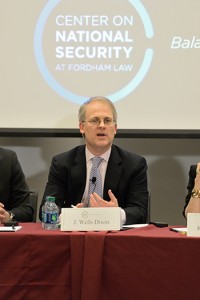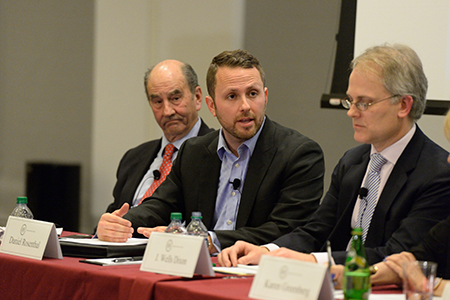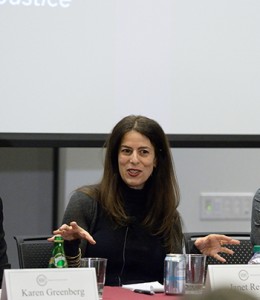President Obama made a promise to close Guantanamo. Can he keep it before he leaves office next year?
In January 2009, shortly after taking office, President Obama signed an executive order to close the detention facilities at Guantanamo Bay. Seven years later, the infamous military prison remains open, with 91 individuals currently detained there. When Obama leaves office next year, will he have fulfilled his promise to close Gitmo? How possible—or impossible—is it to close within the next year?
Karen Greenberg posed these questions to five panelists on January 21 during a Center on National Security event, “Guantanamo Bay: Is an End in Sight?”

While most of the speakers generally expressed hope that the prison would indeed close, their answers were not without reservations or conditions.
“There are two things the president has to do in order to close the prison,” said J. Wells Dixon, senior staff attorney at the Center for
Constitutional Rights. “One is he needs to get his own house in order: He needs to get all the agencies moving in the same direction to implement his mandate to close the prison. The second thing is there needs to be some fundamental policy changes.”
Looming large as one of the current policies that Dixon, who represents some of the detainees, said needs to change is the preference for military commissions over Article III courts (i.e., federal court prosecutions). In Gitmo military commissions, defendants are not afforded the same rights as those they would be entitled to in a civilian court.
“I think the military commissions are tough,” said Daniel Rosenthal, who, prior to his current position at Kroll Risk Management, held various national security positions within the U.S. government. “It’s an untested legal regime. The court is constantly faced with novel legal questions that, in an Article III context, wouldn’t necessarily be novel.”

Attorney Thomas Wilner of Sherman & Sterling LLP was less concerned about military commissions—“Only 10 [of the remaining 91 detainees]are in the military commission system”—and more alarmed by the 47 individuals who are in indefinite detention.
“The great problem with Guantanamo, to me, is not the people we charge with crimes but the people we hold without charge or trial,” he said.

This group of detainees has been labeled by the Obama administration as “too dangerous to release but not capable of prosecution.” According to Wilner, this is a false characterization founded on tenuous, often self-serving, allegations.
Janet Reitman, author and editor at Rolling Stone magazine, related to the audience of more than 100 her journalistic foray into the prison camp, which she described as “a place where the September 11th mindset never dies.” She focused on her visits to two particular Gitmo sites: the area known as Camp Justice, where the military commissions take place; and the “detention center zone,” a term she attributed to her fellow panelist Carol Rosenberg. Both places, Reitman said, reminded her of similar high-security, bunker-like sites she had covered in Iraq in 2004 and 2005.
“You have these two pockets [in Gitmo], and those places are the war,” she said.
Rosenberg, a journalist with the Miami Herald, spoke of the difficulty of reporting on Guantanamo due to the lack of transparency.
“It is a tremendous problem that they no longer allow reporters into the detention center to look at the detainees. In the absence of being able

to actually have reporters going in and talking to guards, seeing conditions, engaging with people in the detention center, we really don’t know what’s going on there.”
After Rosenberg described this “media blackout,” she advanced her view that the administration will not be able to close the site. In fact, she theorizes that the promise of closure is only a political gambit for a plan potentially more troubling.
“When this administration says that they want to close Guantanamo, what they’re really telling you is that they want to move Guantanamo. They are not saying there will be no Guantanamo. They’re saying we’re going to do Guantanamo-style detention in the United States,” she said.
After questions from the audience, Greenberg concluded the event with her own guardedly optimistic opinion.
“I think it’s going to close by the end of [Obama’s] presidency. I don’t think it will be closure in a way that I would have liked to define closure,” she said. “Ironically, I think the hardest nut to crack is not going to be the Yemenis or even indefinite detention, it’s going to be the military commissions.”


